by [email protected] | Nov 16, 2022 | Prescriptions for your Practice
Podcast: Play in new window | Download
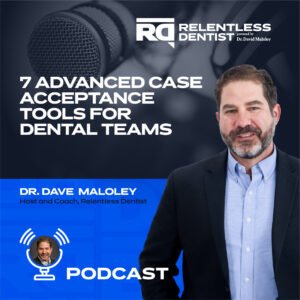 “When you are trying to impress people with words, the more you say, the more common you appear, and the less in control. Even if you are saying something banal, it will seem original if you make it vague, open-ended, and sphinxlike.” — Robert Greene
“When you are trying to impress people with words, the more you say, the more common you appear, and the less in control. Even if you are saying something banal, it will seem original if you make it vague, open-ended, and sphinxlike.” — Robert Greene
Patients can be challenging at times. There are a lot of factors that may cause them to hesitate to get treatment even though they know they need your services. But a great dental team will always move, in a coordinated effort, to make their patients feel that they are well taken care of.
Hey Doc, how good are you and your team at helping patients WANT what they need? If you want to:
- Make case acceptance the easy and obvious choice for your patients,
- Get good at introducing the “elephants” in the operatory,
- Embrace the power of silence so you can become the most trusted dentist around,
Tune in now!
Listen in and find solutions to common practice issues at Prescriptions for Your Practice.
Check out our New Case Study, “Discover How To Recession-Proof Your Dental Practice In The Next 60 Days So That You Increase Profits & Avoid Losing Key Team Members” now at: http://thenorecessiondentist.com/casestudy.
Key Quotes:
- “Leaders are readers.”
- “We’re a needs-based business, but we have to be good at helping patients want what they need.”
- “If there’s any sense of coercion or manipulation in your process, and I doubt it is intentional, make sure that nothing unintentionally dissolves the trust you’ve worked so hard to create.”
- “If it feels like you’re selling treatment. If the patient feels pushed, I think you’ll undermine your case.”
- “Job one is to build a great team. Job two is the team sales team.”
- “If a patient feels judged by you, you cannot influence them and positively impact their dental health.”
- “Some of the limitations are self-worth issues.”
- “Most people will know if you’re in it for their relationship or the transaction, regardless of what you say”.
Featured on the Show:


by [email protected] | Sep 21, 2022 | Prescriptions for your Practice
Podcast: Play in new window | Download
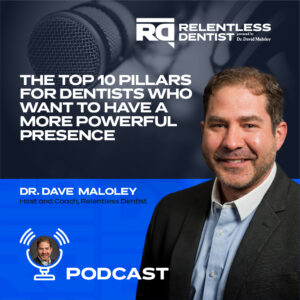 “Focus less on the impression you’re making on others and more on the impression you’re making on yourself.” — Amy Cuddy
“Focus less on the impression you’re making on others and more on the impression you’re making on yourself.” — Amy Cuddy
Sometimes we just want to blend in, right? But what we don’t want to be is forgettable. That’s no good for you, your practice, and your career. So what we’re engineering here is something that minimizes your chance of being forgettable.
Most dentists are forgettable and ignorable. Find out why that is such a big problem in our industry.
Doc, if you want to:
- Know the 4 questions every patient is asking about you,
- Understand how being forgettable can stress you out and kill a dental career,
- Figure out how to be the most respected dentist around so you can drive case acceptance and grow your practice in these turbulent times…
Tune in now!
Listen in and find solutions to common practice issues at Prescriptions for Your Practice.
Check out our New Case Study, “Discover How To Recession-Proof Your Dental Practice In The Next 60 Days So That You Increase Profits & Avoid Losing Key Team Members” now at: http://thenorecessiondentist.com/casestudy.
Key Quotes:
- “Power is value exchange per unit of time. So the more value you add and the less time you do it in, that’s how you increase power. So I think a lot of us as dentists were in denial of power because we’ve seen the misuse of power, which means power that’s uncoupled from integrity.”
- “Power coupled with integrity is really what you want in a business. It’s how you maximize value.”
- “There’s something I’ve talked about several times in this podcast that I’ve used very effectively as a clinician. And that’s called release tension, set intention.”
- “People respect you when they know you will say no to certain things. If you’re just this kind of floppy-noodle people-pleaser personality, they tend to respect you less and take you less seriously.”
- “When we are living consistently with our values, we’re just more powerful.”
- “We had different principles that kind of would pop up to solve different problems, but one consistent principle was ‘never let ’em see you sweat.'”
Featured on the Show:


by [email protected] | Jun 15, 2022 | Prescriptions for your Practice
Podcast: Play in new window | Download
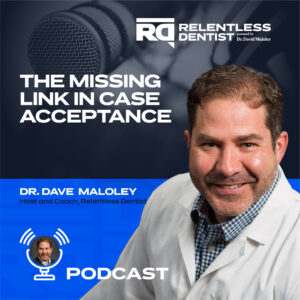 “One of the most sincere forms of respect is actually listening to what another has to say” — Bryant H. McGill
“One of the most sincere forms of respect is actually listening to what another has to say” — Bryant H. McGill
Doc, do you need to get better at Dentistry’s most profitable skill? If you want to…
- earn patient trust and rapport,
- know the key to effective interpersonal communication, and
- understanding your patients so you can improve referral and case acceptance rates,
then tune in now!
We want your dental practice to be full of raving fans, full of people going out in the community and talking about how awesome you are and how great of an experience you create.
Listen in and find solutions to common practice issues at Prescriptions for Your Practice.
If you enjoyed this episode, please share it with your dentist friends. Check my Instagram (@dr.maloley) and TikTok (@dr.maloley) for your daily dose of thought-provoking content so that you can be a better practice owner. Don’t forget to subscribe to the show on iTunes to get automatic episode updates for The Relentless Dentist! And, finally, please take a minute to leave us an honest review and rating on iTunes. They really help us out when it comes to the show’s ranking, and I make it a point to read every single one of the reviews we get.
Key Quotes:
- “Sales is getting more difficult. People are more skeptical. People are tired of being lied to by the media and just assume that no one is to be just trusted at this point in time.”
- “If you are not seeking to understand, there’s a myriad of things that could be getting in the way.”
- “We have to make sure that we don’t need to pitch the service. We have to make sure that we’re solving problems for the patient.”
- “Most people don’t spend time to really understand what makes this individual and what makes them unique.”
- “Active listening from a healthcare provider is rare.”
- “Deep listening means not just listening to the words. It means listening to their emotion.”
Featured on the Show:


by [email protected] | May 25, 2022 | Prescriptions for your Practice
Podcast: Play in new window | Download
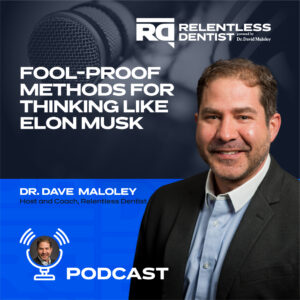 “I don’t know what a business is. All a company is is a bunch of people together to create a product or service. There’s no such thing as a business, just pursuit of a goal — a group of people pursuing a goal.” — Elon Musk
“I don’t know what a business is. All a company is is a bunch of people together to create a product or service. There’s no such thing as a business, just pursuit of a goal — a group of people pursuing a goal.” — Elon Musk
How do you approach your business, and how do you solve your business problems? The problem with the dental practice today is that most dentists, hopefully not you, are running businesses via assumption and conventional thinking. The usual way we conduct our lives is we reason by analogy with an analogy. We are doing this because it’s like something else did or what other people are doing.
In this episode, I will discuss Profiting from First Principles like Elon Musk. So if you want to conduct a “Knowing What I Now Know Analysis” on your practice, build a career that you enjoy, and benefit from non-conventional, fundamental truth thinking to gain an unfair advantage, tune in now!
Listen in and find solutions to common practice issues at Prescriptions for Your Practice.
If you enjoyed this episode, please share it with your dentist friends. Don’t forget to subscribe to the show on iTunes to get automatic episode updates for The Relentless Dentist! And, finally, please take a minute to leave us an honest review and rating on iTunes. They really help us out when it comes to the show’s ranking, and I make it a point to read every single one of the reviews we get.
Key Quotes:
- “You’re smart enough to know, and as a D1 and D2, some of the things that you’re learning, you’re not going to do after you get your dental license.”
- “The possibility is that when you use first principle thinking, you ensure that you’re building a practice that best fits you. And it brings unique value to your community.”
- “Traditional thinking starts with limitations, and then you’re iterating and improving that existing path.”
- “If you just ask a typical dentist, what’s the purpose of your practice? They might say to fix teeth, to give patients back their confidence, smile, to restore oral health, something like that, right? But if you don’t have a customer, a client, a patient, the chair call, whatever you want, you don’t really have a business.”
- “All businesses are a reflection of their owner.”
Featured on the Show:


by [email protected] | Oct 20, 2021 | Prescriptions for your Practice
Podcast: Play in new window | Download
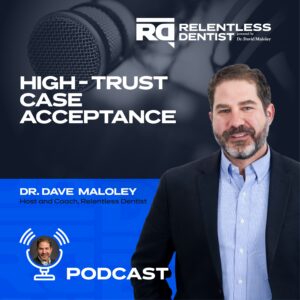 What are we doing to ensure that we’re not presenting treatment in a skeptical environment and inadvertently generating negative marketing for ourselves and our businesses?
What are we doing to ensure that we’re not presenting treatment in a skeptical environment and inadvertently generating negative marketing for ourselves and our businesses?
Research shows that 55% of all communication is in the body language, 38% is in the tone of voice, and 7% is in the actual words spoken — all of which make up the overall impression we give out to our patients.
The way your patients perceive your practice impacts every decision and action they take. This perception has a rippling effect on your confidence, staff, potential customers, and business security.
In today’s episode, I’ll share with you two contrasting personal stories on what enthusing client is and what it’s not. Then, I have some tips that you can train your team on to ensure you’re generating high-trust case acceptance in your practice. I’ll also talk about the importance of picking up non-verbal and social cues to reciprocate appropriate responses.
Tune in and find solutions to common practice issues at Prescriptions for Your Practice.
Key Quotes:
- “If we don’t do our practice in a trusting environment, it can generate buyer’s remorse and resentment if something goes wrong.”
- “Too often, we hang too much on what our patients are telling us, and sometimes they are not candid.”
- “We have to make sure that we’re picking up on the tone of voice and body language before we’re really satisfied that this person is scheduled for the next phase of treatment.”
- “If we don’t read their body language, we can inadvertently scare and confuse the patient.”
- “The possibility is that we appreciate that body language doesn’t lie.”
- “The goal that we must establish and the intent that we should have is that every patient all day long is seen, heard, and felt like we’ve let them know that they matter to us.”
- “You should look for a long-term relationship because it pays dividends again and again and again.”
- “Your team is your eyes, ears, and spokespeople, so they must be good as you are, if not better.”
Featured on the Show:


 “When you are trying to impress people with words, the more you say, the more common you appear, and the less in control. Even if you are saying something banal, it will seem original if you make it vague, open-ended, and sphinxlike.” — Robert Greene
“When you are trying to impress people with words, the more you say, the more common you appear, and the less in control. Even if you are saying something banal, it will seem original if you make it vague, open-ended, and sphinxlike.” — Robert Greene





 What are we doing to ensure that we’re not presenting treatment in a skeptical environment and inadvertently generating negative marketing for ourselves and our businesses?
What are we doing to ensure that we’re not presenting treatment in a skeptical environment and inadvertently generating negative marketing for ourselves and our businesses?